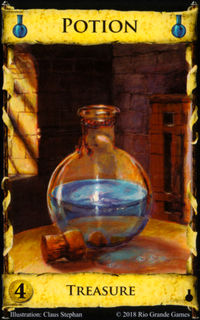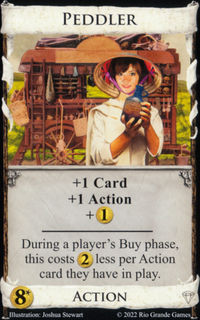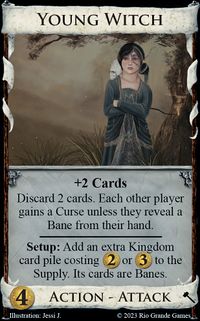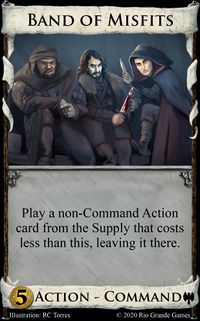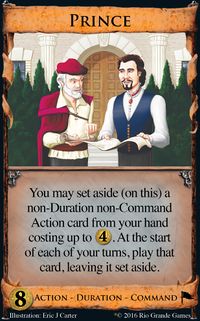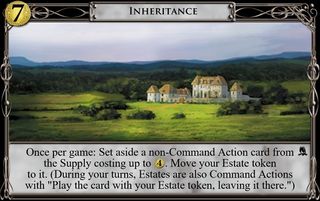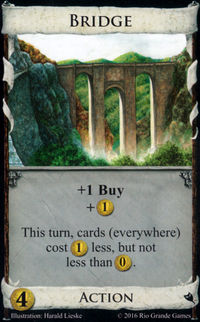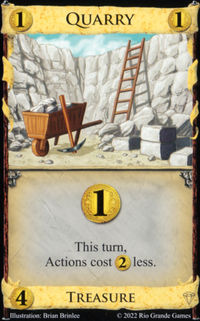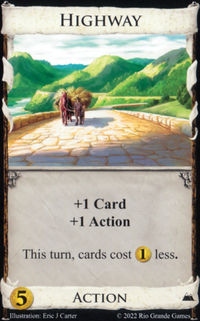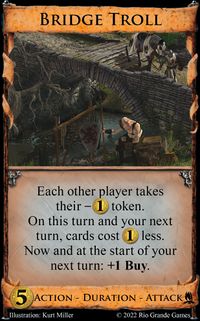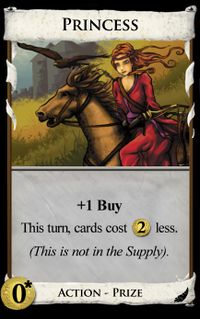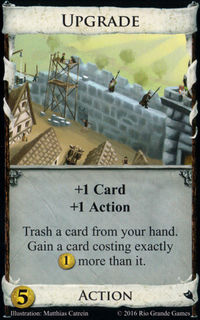Cost
(Updated the paragraph about 0* and X+ cards to be more generic so it includes the rest of the Page/Peasant lines) |
(Major restructuring of the page, many sections generalized to include Events) |
||
| Line 1: | Line 1: | ||
| − | Every card in Dominion has a '''cost''' indicated in its lower left corner. Usually this is some number of [[coin|coins]], symbolized {{Cost|}} | + | Every card and Event card in Dominion has a '''cost'''. A card's cost is indicated in its lower left corner and an Event card's cost is indicated in its upper left corner. Usually this is some number of [[coin|coins]], symbolized {{Cost|}}. |
| − | The costs of some cards from [[Alchemy]] include a {{Card|Potion}}, symbolized {{P}}, in addition | + | == Other symbols in costs == |
| + | The costs of some cards from [[Alchemy]] include a {{Card|Potion}}, symbolized {{P}}, in addition to some number of {{Cost|}} (possibly 0). The {{Cost|}} and {{P}} components of costs are orthogonal; in order to buy a card with {{P}} in the cost, you must have played a {{Card|Potion}} card in addition to sufficient Actions and Treasures to produce the requisite number of {{Cost|}}. | ||
| − | + | An asterisk (e.g., {{Cost|0*}}) indicates a card's cost is not what it seems. Cards belonging to piles not in the [[Supply]] have asterisks in their costs to remind players that, despite having a cost, they cannot be bought. {{Card|Peddler}} has an asterisk in its cost to remind players it has an effect which changes its cost. | |
| − | + | The costs of some cards from [[Guilds]] include a plus sign (e.g., {{Cost|3+}}), which indicates that a card may be [[overpay|overpaid]] for. | |
| − | + | Asterisk and plus signs are only reminders; a card still has its normal cost for all purposes described below. | |
| − | + | == Purposes of costs == | |
| + | The primary purpose a card's or Event's cost for [[buy|buying]] it. In order to be able to buy something, you must have generated at least the requisite number of {{Cost|}} and {{Cost|P}} by playing [[Action]] and [[Treasure]] cards, spending [[coin token|coin tokens]], or buying Events (and not yet spent them on other cards or Events). | ||
| − | Most [[ | + | Costs can serve other functions in gameplay, outside of their role in buying something. For example, most [[gainer|gainers]] and several [[trashing attack|trashing attacks]] can only gain or trash cards of specified costs; most [[trash-for-benefit]] cards have effects that depend on the cost of the trashed card; a card's cost determines whether it is eligible to serve as the Bane for {{Card|Young Witch}}, imitated by {{Card|Band of Misfits}}, or set aside by {{Card|Prince}} or {{Event|Inheritance}}. For this reason, all cards have costs—even those that it is never possible to buy, such as [[Shelter|Shelters]] and [[Prize|Prizes]]. |
| + | |||
| + | == Changes in cost == | ||
| + | Some cards have effects that temporarily change the costs of some or all cards—{{Card|Bridge}}, {{Card|Quarry}}, {{Card|Peddler}}, {{Card|Highway}}, {{Card|Bridge Troll}}, and {{Card|Princess}}. A player's -{{Cost|2}} Cost [[Adventures tokens|token]] temporarily changes costs on his turn. When these effects occur, costs are changed for all purposes—not only the cost of buying cards is changed, but so are other effects that depend on cost such as those listed above. | ||
| + | |||
| + | == Strategy == | ||
| + | In general, more "powerful" cards and Events have higher costs, but overall power is not the only consideration that goes into determining something's cost. ({{Card|Chapel}}, for example, is often cited as a card whose power is disproportionate to its low cost of {{Cost|2}}.) Costs between {{Cost|2}} and {{Cost|4}} especially are influenced by how useful a card is as an [[opening]], and how desirable or necessary it is to be able to accumulate multiple copies of a card with extra [[+Buy]]. Cards with on-gain or on-buy effects typically cost more than their on-play effect would seem to require. | ||
| + | |||
| + | Most [[Kingdom card|Kingdom cards]] cost between {{Cost|2}} and {{Cost|6}}; there are only six costing more than {{Cost|6}} and one costing less than {{Cost|2}}. This means that, in most games of Dominion, there is a gap in the supply at those costs. This gap can influence gameplay in subtle but substantial ways: for instance, it means that {{Card|Upgrade}} can be used to trash {{Card|Copper}} without gaining anything, but cannot be used to gain {{Card|Province}}. In the rare games when {{Cost|1}}- or {{Cost|7}}-cost cards are in the Supply, therefore, the utility of a card like Upgrade can change dramatically. | ||
{{Navbox Strategy}} | {{Navbox Strategy}} | ||
Revision as of 22:36, 26 April 2015
Every card and Event card in Dominion has a cost. A card's cost is indicated in its lower left corner and an Event card's cost is indicated in its upper left corner. Usually this is some number of coins, symbolized .
Contents |
Other symbols in costs
The costs of some cards from Alchemy include a Potion, symbolized , in addition to some number of (possibly 0). The and components of costs are orthogonal; in order to buy a card with in the cost, you must have played a Potion card in addition to sufficient Actions and Treasures to produce the requisite number of .
An asterisk (e.g., ) indicates a card's cost is not what it seems. Cards belonging to piles not in the Supply have asterisks in their costs to remind players that, despite having a cost, they cannot be bought. Peddler has an asterisk in its cost to remind players it has an effect which changes its cost.
The costs of some cards from Guilds include a plus sign (e.g., ), which indicates that a card may be overpaid for.
Asterisk and plus signs are only reminders; a card still has its normal cost for all purposes described below.
Purposes of costs
The primary purpose a card's or Event's cost for buying it. In order to be able to buy something, you must have generated at least the requisite number of and by playing Action and Treasure cards, spending coin tokens, or buying Events (and not yet spent them on other cards or Events).
Costs can serve other functions in gameplay, outside of their role in buying something. For example, most gainers and several trashing attacks can only gain or trash cards of specified costs; most trash-for-benefit cards have effects that depend on the cost of the trashed card; a card's cost determines whether it is eligible to serve as the Bane for Young Witch, imitated by Band of Misfits, or set aside by Prince or Inheritance. For this reason, all cards have costs—even those that it is never possible to buy, such as Shelters and Prizes.
Changes in cost
Some cards have effects that temporarily change the costs of some or all cards—Bridge, Quarry, Peddler, Highway, Bridge Troll, and Princess. A player's - Cost token temporarily changes costs on his turn. When these effects occur, costs are changed for all purposes—not only the cost of buying cards is changed, but so are other effects that depend on cost such as those listed above.
Strategy
In general, more "powerful" cards and Events have higher costs, but overall power is not the only consideration that goes into determining something's cost. (Chapel, for example, is often cited as a card whose power is disproportionate to its low cost of .) Costs between and especially are influenced by how useful a card is as an opening, and how desirable or necessary it is to be able to accumulate multiple copies of a card with extra +Buy. Cards with on-gain or on-buy effects typically cost more than their on-play effect would seem to require.
Most Kingdom cards cost between and ; there are only six costing more than and one costing less than . This means that, in most games of Dominion, there is a gap in the supply at those costs. This gap can influence gameplay in subtle but substantial ways: for instance, it means that Upgrade can be used to trash Copper without gaining anything, but cannot be used to gain Province. In the rare games when - or -cost cards are in the Supply, therefore, the utility of a card like Upgrade can change dramatically.
